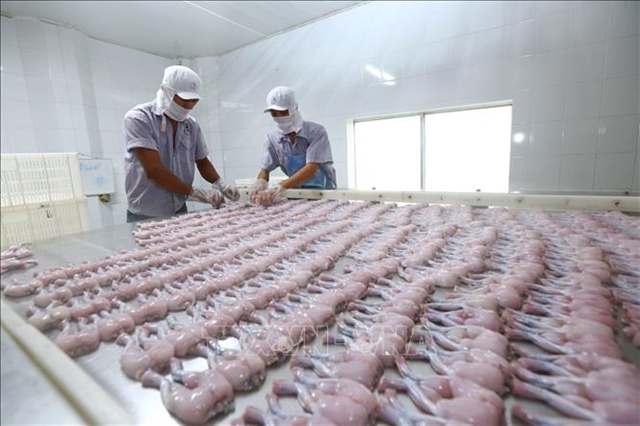VN's agro-forestry-fishery earns US$6.2 billion trade surplus
Viet Nam ran a surplus of US$6.2 billion in agro-forestry-fishery trade in January-August, 4.9 per cent higher than the same period last year, the latest updates of the Ministry of Agriculture and Rural Development showed.
 |
| Frog legs processed for export at Tan Thanh Loi Company, Long An Province. Viet Nam's agro-forestry-fishery exports totalled $26.1 billion in the first eight months of this year. — VNA/VNS Photo Danh Lam |
Agro-forestry-fishery exports totalled $26.1 billion in the first eight months of this year, representing a drop of 0.9 per cent over the same period last year while the country imported farming products worth $19.9 billion, a fall of 2.5 per cent.
The US was the largest export market of Vietnamese agro-forestry-fishery products with a revenue of more than $6.3 billion in January-August, a year-on-year increase of 14.2 per cent.
China came second with revenue of $6.28 billion, a drop of 10.1 per cent.
Agro-forestry-fishery exports to other major markets also saw decreases, such as to the EU with a revenue of $2.5 billion, falling by 2.2 per cent, ASEAN market $2.24 billion, down by 11.4 per cent, Japan $2.2 billion, down by 1.8 per cent.
Products which saw increases in exports included rice worth $2.2 billion, up 10.4 per cent, vegetables $487 million, up 12.8 per cent, cassava $108 million, up 95 per cent, shrimp $2.4 billion, up 11.4 per cent and wood products $7.3 billion, up 9.6 per cent.
Some products posted drops, such as rubber by 13 per cent to $1.2 million, pepper by 20 per cent to $445 million, fruits by 18 per cent to $1.7 billion and tra fish by 26 per cent to $959 million.
The Ministry of Agriculture and Rural Development said as the COVID-19 pandemic significantly affected agro-forestry-fishery exports, the ministry from the beginning of this year focused on implementing measures to remove difficulties and promote exports to key markets.
The market development was watched to provide warnings, especially about new rules of import markets, to actively adjust production and avoid putting pressure on the domestic consumption.
Negotiations to expand markets were also promoted.
As the COVID-19 pandemic was still causing difficulties, the ministry said that close watch would be placed on the markets which were heavily affected by the pandemic, such as cross-border trade of agricultural products to China, so that solutions would be developed to facilitate exports.
The ministry would also focus on implementing measures to increase pork supply and stabilise prices.
Source: VNS